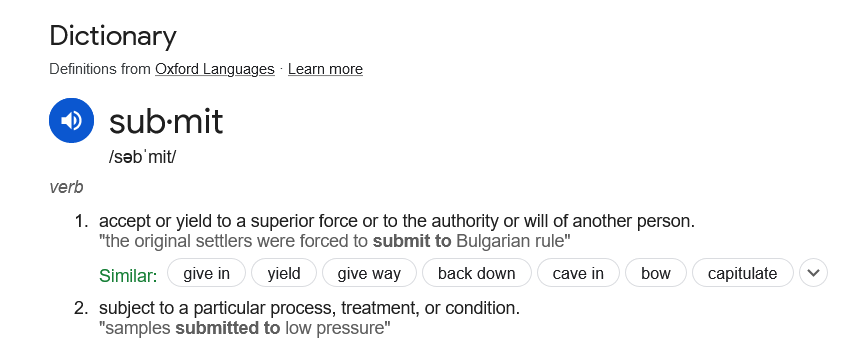Summary (TL;DR)
Traditional relationships often involve the idea of submission, especially for women. However, this concept can be outdated and limiting in modern society. Complementary partnerships, where both individuals share leadership and support each other based on their strengths, offer a more fulfilling and balanced approach. This model prioritizes mutual respect, open communication, and recognizes that everyone deserves to have their needs met. By embracing a partnership mindset, couples can experience deeper emotional connection, greater personal fulfillment, and a more resilient bond. If the concept of submission makes you uncomfortable, it might be helpful to reflect on your own experiences and envision a relationship dynamic that feels empowering for both of you.
The image of a dominant husband and a submissive wife has long loomed over our understanding of relationships. But as society evolves, so too do our ideas about love and partnership. While this traditional dynamic may have worked for some in the past, many of us are finding it limiting and outdated. The idea of complementary partnerships – where individuals work together in a spirit of mutual respect and shared leadership – is a far more appealing and fulfilling model for healthy, modern relationships.
Submission: Historical Context and Modern Perspectives

The word “submission” carries complex connotations. It implies yielding oneself to a higher power or accepting a subordinate position. Historically, in relationships, this often manifested as women being expected to submit to men’s authority. While this might have offered a sense of security or structure in some instances, it also held the potential for abuse and a suppression of women’s voices and potential.
Today, perspectives on submission are more nuanced. Some view it negatively, associating it with a lack of agency or equality. Others see it as a possible dynamic within a healthy relationship, as long as it’s a freely chosen agreement rooted in trust and respect. For me, the concept of submission is heavily influenced by my personal experiences, and I believe this sheds light on why others might feel similarly.
The Limitations of “Submission” in Modern Relationships
In modern society, where equality and mutual respect are cornerstones, the idea of submission can be problematic. When one person is expected to consistently suppress their needs in favor of another, resentment can build, hindering intimacy. It can also rob individuals, particularly women, of the chance to develop their full potential. When we are encouraged to conform to rigid gender roles, we miss out on the richness and balance that a more dynamic approach to relationships can provide.
Toward Complementarity: Finding Balance and Partnership

Complementary partnerships thrive on a different ethos. Instead of strict ‘leader’ and ‘follower’ roles, a truly successful couple recognizes that each person has unique strengths. There is power in open communication, acknowledging individual needs and expectations, and working together to find the best solutions for the relationship as a whole. This doesn’t mean there’s never one person taking the lead. Healthy partnerships are dynamic—sometimes one person steps forward, sometimes the other does, depending on the situation.
My Story
My father had Narcissistic Personality Disorder (NPD), a fact I tragically only discovered after both he and my mother passed away. His behavior left a lasting impression on me. He would manipulate and control people, always needing to be seen as superior to get his way. Because of this, the notion of submitting to anyone triggers a visceral reaction in me. It’s not about defiance; it’s about knowing that not everyone is equipped to lead in healthy, mutually beneficial ways.
This doesn’t mean I reject the idea of having a supportive partner. If someone wants to lead in a certain area of our lives and they explain their intentions, I’m open to that, provided it aligns with my moral compass and I feel comfortable. Relationships are about finding a balance that works for both people. And that balance doesn’t always look like one person submitting to the other.
I grew up in a single-parent household and rarely saw healthy leadership modeled by my father. This background undoubtedly shapes my approach to partnerships, and it might be similar for others who come from less-than-ideal dynamics.
Benefits of Partnership over Submission

When we break free from traditional models of relationships and embrace partnership, the rewards for both individuals are immense. One of the biggest benefits is a deeper sense of personal fulfillment. In a model built on submission, one person’s needs and desires often take center stage, leading to an imbalance. In a complementary partnership, however, both individuals feel genuinely seen, heard, and valued. There’s space for your dreams, your goals, and your unique contributions are celebrated. This creates a sense of fulfillment and motivation that is far more nourishing than being expected to suppress parts of yourself to fit a prescribed role.
By shifting to this partnership focus, emotional connection and intimacy in the relationship naturally deepen. When you have the safety and reassurance to express your needs without fear of judgment, you allow your partner to truly understand and love you. Trust is built on mutual respect and the knowledge that your well-being is just as important to your partner as their own. This fosters a deep sense of security, where you can be vulnerable, share your fears, and celebrate your victories together. This level of closeness isn’t easily achieved in a relationship where one person is expected to constantly defer to the other.
True partnerships are also inherently more resilient. Life will bring unexpected challenges, but when facing them as a united team, the burden feels lighter. You share the responsibility, draw strength from each other, and find creative solutions as you leverage your complementary skill sets. In a dynamic partnership, there’s flexibility. You adapt and switch roles as needed, instead of getting trapped by outdated expectations of who should do what. This resilience strengthens your bond and gives you the confidence to overcome obstacles together.
Perhaps one of the most important aspects of a successful partnership, and one that’s often neglected in submission-based models, is open and honest communication. So many relationship breakdowns occur due to unspoken expectations, misunderstandings, and assumptions. When there’s an imbalance of power, one person might hesitate to voice their true needs, planting the seeds of resentment. In a partnership, there’s an ongoing dialogue, a safe space to express desires, and tackle disagreements with respect instead of fear. By establishing this foundation of open communication, you build a relationship that can withstand conflicts and evolve with you over time.
Embrace Change
The choice of embracing complementary partnership leads to a more satisfying, modern model for relationships. Here, both individuals take turns supporting and leading based on their strengths and circumstances. If you find yourself struggling with concepts like submission, consider reflecting on your own experiences and what kind of relationship dynamic you believe would lead to your greatest happiness and fulfillment.





